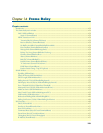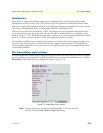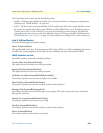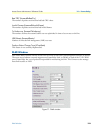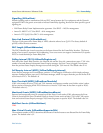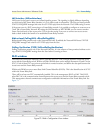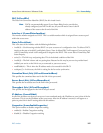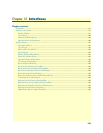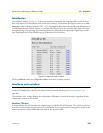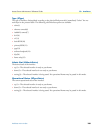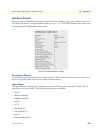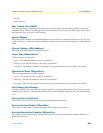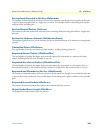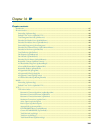
DLCI window 177
Access Server Administrators’ Reference Guide 14 • Frame Relay
DLCI (frCircuitDlci)
The Data Link Connection Identifier (DLCI) for this virtual circuit.
Note
DLCIs can automatically appear if your Frame Relay Service provider has
already configured your link. In this case, all you will need to enter is the IP
address of the router at the far end of the link.
Interface # (FrameIPInterfaceNum)
The interface number assigned to a DLCI. This is a variable number which is assigned from a resource pool
within the access server.
State (frCircuitState)
This is the state of the interface with the following definitions:
• invalid(1)—Use this setting to delete DLCI’s on your access server’s configuration view. To delete a DLCI,
simply set the state to invalid(1) and Submit Query. Note: A deleted DLCI will reappear if your service pro-
vider’s Frame Relay switch is still configured to recognize that DLCI. This occurs after a Frame Relay Full
Status Enquiry.
• active(2)—The link is up and passing data. This is the desired condition of the link.
• invalid(3)—The link is down and not passing data. Reasons for this may be your service provider hasn’t
enabled your service or the link is not yet connected to your access server.
• needIPaddr(4)—This is when the IP address needs to be entered for this DLCI.
• wait4peer(5)—In this state, the Link is waiting for the far end to synchronize.
Committed Burst (bits) (frCircuitCommitedBurst)
This specifies the committed data rate for the link in bits-per-second.
Excess Burst (bits) (frCircuitExcessBurst)
This specifies the excess data rate for the link in bits-per-second.
Throughput (bits) (frCircuitThroughput)
This specifies the throughput for the link in bits-per-second.
IP Address (FrameIPAddr)
As all of the interfaces on the access server run in un-numbered mode, the IP address to enter is that of the far
end router. This is not the IP address of the access server. After the IP address is entered, it will appear as a
point-to-point link in the IP routing table with this address.
Congestion (frameEnableCongestion)
This option enables or disables congestion tracking.
• enable(0)—Enables Congestion tracking
• disable(1)—Disables Congestion tracking




